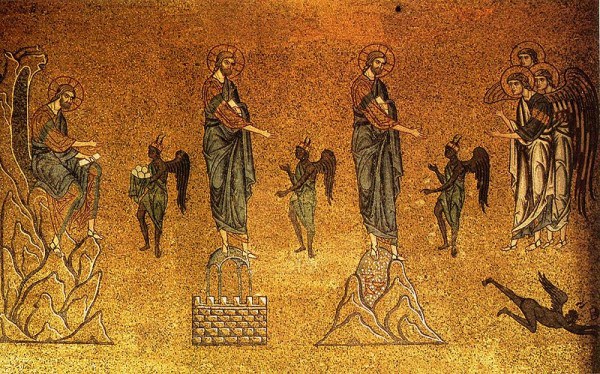Translation from the book:
Στεργίου Ν. Σάκκου, Ἑρμηνεία στό κατά Λουκᾶν Εὐαγγέλιο, τόμ. Α΄,
ἐκδ. «ΧΡΙΣΤΙΑΝΙΚΗ ΕΛΠΙΣ» ΟΡΘΟΔΟΞΗ ΑΔΕΛΦΟΤΗΤΑ, Θεσ/νίκη 2008, σσ. 167-179
(Stergios N. Sakkos [Read CV], A Commentary on the Gospel according to St. Luke, vol. A', pp. 167-179)
 The temptations of Jesus (see Mt 4:1-11; Mk 1:12-13; Lk 4:1-13) are among the most difficult and theological themes of the Holy Scriptures. Careful study and divine enlightenment are required for their correct understanding and utilization in the spiritual struggle. First of all, it would be appropriate to give an answer to a crucial question: How did Satan tempt Jesus?
The temptations of Jesus (see Mt 4:1-11; Mk 1:12-13; Lk 4:1-13) are among the most difficult and theological themes of the Holy Scriptures. Careful study and divine enlightenment are required for their correct understanding and utilization in the spiritual struggle. First of all, it would be appropriate to give an answer to a crucial question: How did Satan tempt Jesus?
After the fall of Adam and Eve, the devil gained access to all their descendants. It is no longer possible for anyone to remain sinless, because the devil interferes in the world of every person's thoughts, will and feelings. Jesus, of course, was a God-man, a fact that the devil was unaware of. He saw him as a mere man, yet he could not penetrate him and tempt him with a thought or a sinful desire; therefore, he attacked him externally. He appeared before him either as a hideous figure or in the form of a human or an angelic being (see 2 Co 11:14) and tried to persuade Jesus by deceitful words in order to submit to his temptations.
4,1. Ἰησοῦς δὲ πλήρης Πνεύματος ἁγίου ὑπέστρεψεν ἀπὸ τοῦ Ἰορδάνου, καὶ ἤγετο ἐν τῷ Πνεύματι εἰς τὴν ἔρημον.
4:1 Then Jesus, full of the Holy Spirit, returned from the Jordan and was led by the Spirit in the wilderness.
The designation of being “full of the Holy Spirit” is also attributed to other persons in the New Testament; to the Baptist (see Lk 1:15), to Peter (see Acts 4:8), to Stephen (see Acts 6:5), to Barnabas (see Acts 11:24), to Paul (see Acts 13:9). All these were filled with the Holy Spirit’s gifts. But Jesus, as the God-man, had all the Holy Spirit his own (see comments on 2:11); he was inseparably united with the Paracletus, i.e. the Holy Spirit, as well as with the Father (cf. Jn 3:34-35). That is why he later assures his disciples that during his earthly life, as long as he was near them, the Holy Spirit was also near them; his promise that after his departure from this world he would send the Paracletus into their hearts means that he would then also dwell within them (see Jn 14:16-17.20).
When Jesus “returned from the Jordan”, after his baptism, “was led by the Spirit into the wilderness”, he was led into a desolate, uninhabited region by the prompting of the Holy Spirit. It is said that Jesus was "led", so that believers would learn not to expose themselves to temptation on their own.
The purpose of Jesus' sojourn into the wilderness, where he was "with the wild beasts" (Mk 1:13) was not only to prepare himself for the beginning of his work by quietness, prayer and fasting, but especially to confront the devil (see Mt 4:1). The wilderness is chosen as the site of the confrontation, because isolation is always the most fertile ground for the devil’s attacks. It is not accidental that even in paradise the devil approached Eve when he found her alone (see Gen 3:1).
4,2. ἡμέρας τεσσαράκοντα πειραζόμενος ὑπὸ τοῦ διαβόλου, καὶ οὐκ ἔφαγεν οὐδὲν ἐν ταῖς ἡμέραις ἐκείναις· καὶ συντελεσθεισῶν αὐτῶν ὕστερον ἐπείνασε.
4:2 for forty days tempted by the devil. And he ate nothing in those days; and when they were ended, he was hungry.
The Jews fasted during the day, and ate in the evening. Only on the feast of the Atonement their fasting lasted from the afternoon of one day until the afternoon of the next. Jesus, however, ate nothing throughout his sojourn in the wilderness (cf. Mt 4:2). After forty days, however, he was hungry, as St Andrew of Crete chants in the 9th Ode of the Great Canon. As a perfect man he had all the natural characteristics of human nature; hunger (see Mt 21:18), thirst (see Jn 19:28), sleep (see Mt 8:24), fatigue (see Jn 4:6). As a God-man, of course, he could have fasted more days. But he did not want to go beyond the limit of forty days, to which Moses (see Ex 34:28) and Elijah (see 1 Kings 19:8) had reached in the past, lest by surpassing human strength he would not be believed he was indeed a man. He did not fast, moreover, as God - as God He had no need of food or fasting - but as a man, in order to inspire temperance in people.
St. Chrysostom explains Jesus’ action with the following illustrative example: Coaches deliberately clash with others in the wrestling ring, in order to teach their trainees how to fight and defeat their opponents. So, Jesus was hungry and made his hunger known to the devil, in order to give him an excuse - the devil is used to take advantage of our weaknesses - to fight against him and to show how believers must face devil’s attacks, in order to defeat and overcome him.
In the patristic teaching it is emphasized that enslavement to the stomach is the root of a multitude of sins and is directly connected to man's exit from paradise. The doctor, after having cured the sick person, instructs him not to repeat the things from which the illness originated. Similarly, says St. Chrysostom, Jesus is fasting after baptism, because the sins before baptism were caused by the slavery to stomach.
4,3. Καὶ εἶπεν αὐτῷ ὁ διάβολος· εἰ υἱὸς εἶ τοῦ Θεοῦ, εἰπὲ τῷ λίθῳ τούτῳ ἵνα γένηται ἄρτος.
4:3 The devil said to Him, "If you are God's Son, tell this stone to become bread".
The devil, while he had a "file" on all humans, since they were all sinners, he had no "file" on Jesus. His sinlessness, as well as the events that accompanied his birth, had deeply troubled him. He also heard God the Father call him "a beloved son" (see Mt 3:17; Mk 1:11; Lk 3:22). He heard also the testimony of John the Baptist; "I have seen and I have borne witness that this is the Son of God" (Jn 1:34). But he could not understand in what sense he was called God’s son. He therefore sought to gather more information. So, taking advantage of Jesus' hunger, he asked him to prove that he was the son of God by performing a miracle, turning the stone into bread.
Later, many times the demons called Jesus "son of God" (see Mt 8:29; Mk 1:24; 5,7; Lk 4:34. 41; 8:28). This is the same trap that Satan set for him the first time in the wilderness, repeating what he had heard at the baptism, in order to unravel the mystery about Jesus. Christ’s divinity, however, remained unknown to the devil. Had he realized that he had God before him, he would never had prompted his people to crucify him. The Lord kept his plan for man's salvation secret (see Rom 14:24; Eph 3:9; Col 1:26).
4,4. Καὶ ἀπεκρίθη ὁ Ἰησοῦς πρὸς αὐτὸν λέγων· γέγραπται ὅτι οὐκ ἐπ᾿ ἄρτῳ μόνῳ ζήσεται ἄνθρωπος, ἀλλ᾿ ἐπὶ παντὶ ῥήματι ἐκπορευομένῳ διὰ στόματος Θεοῦ.
4:4 And Jesus answered him, saying; It is written that man shall not live by bread alone, but by every word spoken by God’s mouth.
Jesus did not use his divine power to resist temptation. He set forth the spiritual weapons, which every "good soldier of Jesus Christ" has at his disposal (2 Tim 2:3). By the "sword of the Spirit, which is the word of God" (Eph 6:17), by the word of the Holy Scriptures, he disarmed and humiliated the devil. He used the passage of the Deuteronomy (8:3), to emphasize that God has the power to sustain his creatures in life in a variety of ways. In the history of Israel, incidents are mentioned where God’s love was manifested in a miraculous way taking care for the sustenance of the people with special affection (cf. Ex 16:4-22; 1 Kings 17:2-16).
But also, in the New Testament the events of the feeding of the five thousand (cf. Mt 14:15-21; Mk 8:1-9; Lk 9:12-17; Jn 6:5-15) and the four thousand (cf. Mt 15:32-38; Mk 6:35-44) are characteristic, where the Lord interrupts the sermon to feed his audience, and even with a miracle. Moreover, in the Sunday prayer he included the request: " Give us this day our daily bread" (Mt 6:11). God is not indifferent to people's material needs. He does, however, desire the liberation of His devotees from material things (cf. Mt 6:25-34). Jesus, after his conversation with the Samaritan woman, reveals that his food is the fulfillment of the divine will and his holy mission (see Jn 4:34). To the members of the Church, Christ himself is offered as "the bread of life" (see Jn 6:32-58). Many saints, were nourished by the Word of God and the Sacrament of the Eucharist, overcame the sense of hunger and reached wondrous heights of exercise and continence-abstinence.
4,5. Καὶ ἀναγαγὼν αὐτὸν ὁ διάβολος εἰς ὄρος ὑψηλὸν ἔδειξεν αὐτῷ πάσας τὰς βασιλείας τῆς οἰκουμένης ἐν στιγμῇ χρόνου.
4:5 And the devil took him up, and showed him all the kingdoms of the world in a moment.
It is not mentioned how Satan carried Jesus from the wilderness to the high mountain and how he showed him the kingdoms of the whole world; certainly, in a supernatural way. Satan is a spirit and possesses supernatural power. It was not at all difficult for him to take his opponent to the highest peak of the mountain he was on or to take him to another mountain and surprise him by showing him all the kingdoms of the world in one moment, like in a movie. Jesus tolerates all this because he wants his confrontation with the devil to take place.
None of the evangelists record the name of the mountain, apparently, because they didn't find it noteworthy. Since the 12th century a tradition has developed which locates the place of the temptations between Jerusalem and Jericho, on the so-called Mount Sarantario. However, it is possible that Jesus was taken to Lebanon or elsewhere. The Gospel is not interested in satisfying human curiosity. It aims to teach the truth of salvation.
4,6-7. καὶ εἶπεν αὐτῷ ὁ διάβολος· σοὶ δώσω τὴν ἐξουσίαν ταύτην ἅπασαν καὶ τὴν δόξαν αὐτῶν, ὅτι ἐμοὶ παραδέδοται, καὶ ᾧ ἐὰν θέλω δίδωμι αὐτήν· σὺ οὖν ἐὰν προσκυνήσῃς ἐνώπιόν μου, ἔσται σου πᾶσα.
4:6-7 And the Devil said to him, "To you I will give all this authority and their glory, for it has been handed over to me, and I give it to whom I will. If therefore you will worship me, it shall all be yours”.
Satan is "the ruler of this world" (Jn 12:31; 14:30; 16:11), since people surrender their freedom and live in submission to his commands. He offered to Jesus authority and glory, and in return he asked him to kneel down to worship him, that is, to give him honor and worship that belongs only to God.
The devil usually does not directly demand that man cease to worship God. In a deceitful way he tries to persuade him to submit once to his own command. But if this happens, very quickly Satan becomes the sole and exclusive master and oppressor of man. The Lord’s word is clear: "No man can serve two masters: for either he will hate the one, and love the other; or else he will hold to the one, and despise the other. You cannot serve God and mammon. " (Mt 6:24; cf. Lk 16:13).
4,8. Καὶ ἀποκριθεὶς αὐτῷ εἶπεν ὁ Ἰησοῦς· ὕπαγε ὀπίσω μου, σατανᾶ· γέγραπται γάρ, Κύριον τὸν Θεόν σου προσκυνήσεις καὶ αὐτῷ μόνῳ λατρεύσεις.
4:8 And Jesus answered and said to him, “Go behind me, Satan: for it is written, you shall worship the Lord your God, and him only you shall serve.
Jesus, with disgust, rejected the insolent demand of the one he was talking to, saying, “Go behind me, Satan”. The way in which he addressed him shows that his opponent was not unknown to him. He is the objector -thus the name "Satan" is translated-, the one who opposes God’s will (cf. Mt 16:23). How was it possible for Jesus to kneel and worship his ancient enemy? To declare allegiance to him from whose bondage he came to free man? Later he would say it clearly to Pilate; "My kingdom is not of this world" (Jn 18:36).
So, he defeated the devil by using again a passage from Deuteronomy (6:13). The God-inspired word of the Holy Scriptures expressly commands; Worship and adoration are not fit for anyone but God. In obedience to this command, the Church from the very first beginning took the necessary steps and struck down the angel-worship that had begun to appear (Col 2:16-23), while at the same time it set honour, not worship, to the saints and angels.
Luke recounts as the second the temptation which Matthew mentions as the third. This difference, however, undeniably does not imply disagreement. It is well known (see comments on 1:1) that Luke does not follow a chronological order in his narratives.
4,9. Καὶ ἤγαγεν αὐτὸν εἰς Ἰεροσόλυμα καὶ ἔστησεν αὐτὸν ἐπὶ τὸ πτερύγιον τοῦ ἱεροῦ καὶ εἶπεν αὐτῷ· εἰ υἱὸς εἶ τοῦ Θεοῦ, βάλε σεαυτὸν ἐντεῦθεν κάτω.
4:9 And he took him to Jerusalem, and set him on the pinnacle of the Temple, and said to him, “If you are the Son of God, throw yourself down from here”.
The devil, finally, led Jesus to Jerusalem, "to the holy city", as Matthew (4:5) notes, addressing the Jewish Christians.
The edge of a roof is called a “pinnacle”, because of its shape. It probably belonged to the highest building of the Temple. Probably there was a cliff beneath it.
Repeating the phrase, "If you are the Son of God," the devil challenges Jesus a second time to give a proof of who he really was. It was possible, of course, that the devil had hoped that Jesus' fall would cause his death.
4,10-11. γέγραπται γὰρ ὅτι τοῖς ἀγγέλοις αὐτοῦ ἐντελεῖται περὶ σοῦ τοῦ διαφυλάξαι σε, καὶ ὅτι ἐπὶ χειρῶν ἀροῦσί σε, μήποτε προσκόψῃς πρὸς λίθον τὸν πόδα σου.
4:10-11 for it is written, “He will give his angels charge of you, to guard you, and on their hands they will bear you up, lest you strike your foot against a stone”.
Satan challenges Jesus to voluntarily throw himself from the pinnacle of the Temple, so that the angels may save him and thus offer an impressive spectacle to the people. Trying to imitate the Lord, he also uses a passage from the Psalms 91(90):11-12. However, he does not mention it in full, but omits the phrase: “in all your ways”. The passage does not refer personally to Jesus, but to every pious man who keeps God's commandments. The meaning is that God sends his angels to protect his own people in the course of their life, when they are in need. But divine help is offered to those who face a real need by faith, and not to those who willingly throw themselves into danger in order to test God’s power. The tactics of the ancient snake - already known since the fall of the first man and woman - to pervert God’s words are well known. The same tactics are followed by heretics; they cut off and trim the texts of the Holy Scriptures and thus distort their meaning.
4,12. Καὶ ἀποκριθεὶς εἶπεν αὐτῷ ὁ Ἰησοῦς ὅτι εἴρηται, οὐκ ἐκπειράσεις Κύριον τὸν Θεόν σου.
4:12 And Jesus answered him, “It is said, you shall not tempt the Lord your God”.
Jesus rebuts Satan with another passage from Deuteronomy (6:16). It is unacceptable for anyone to seek signs by tempting God, putting his providence and omnipotence to the test. This is how the Israelites had tempted the Lord in the wilderness and were severely punished for it! Only two of them, Joshua and Caleb, were considered worthy to see the fulfilment of God's promise, to enter the promised land (See Num ch. 14; cf. Heb 3:19)
4,13. Καὶ συντελέσας πάντα πειρασμὸν ὁ διάβολος ἀπέστη ἀπ᾿ αὐτοῦ ἄχρι καιροῦ.
4:13 And when the devil had ended every temptation, he departed from him for a time.
The devil wanted to strike the sinless Jesus with his three sharp arrows; gluttony, greed, vanity. These three great temptations include all the others. That is why the evangelist Luke writes that the devil went away, when “had ended every temptation”, after he had tried against his adversary every kind of temptation. After his departure, angels came to minister to Jesus, as Matthew (4:11) and Mark (1:13) note. St Chrysostom stresses to every struggling Christian "And you will be received by angels after your victory against him (the devil)". As long as the insult against him lasted, the Lord did not allow the angels to appear, so that Satan would not avoid the conflict with him.
The temporal expression “for a time” means that the devil went away but was determined to fight back, as soon as he found again a suitable opportunity. The objection, the doubt, the disapproval which Jesus faced throughout his public ministry are the temptations which Satan threw against him using men as his instruments. The Lord himself also referred to them, when later he said to his disciples, "You are they who have continued with me in my temptations" (Lk 22:28). The climax, of course, of the warfare and the final conflict was the Passion and the crucifixion. The glory of the Resurrection that followed revealed the defeat and the humiliation of Satan.
However, until his final crushing, the devil (see Rev 20:10) tries with deceitfulness to trap and distort the Church, which according to St Augustine, is Jesus "extending to the ages". The temptations which Satan uses against Church are similar to those which the Lord faced in the desert;
α) In its effort to take care of the material needs of the faithful, the Church risks falling into the trap of the devil; to be mainly absorbed in social, charitable and ecological work and to neglect its primary mission, that is, to nourish people with the Word of God and to vaccinate them with the Holy Sacraments.
b) It runs the risk of succumbing to the temptation of power. This truth is confirmed by the negative examples of the Western so-called Christian denominations. They wanted to assume secular power, as happened with Savonarola in Florence, Calvin in Geneva, or the Pope and the Vatican State and lost their primary mission and their spirituality. The Church has spiritual jurisdiction, not secular; its greatest strength is holiness.
c) It is often tempted to make its worship a spectacle, with the aim of impressing. However, such a tactic reduces the sense of deep piety and spirituality of the feasts and increases their secularity. "God is a Spirit: and they that worship him must worship him in spirit and in truth." (Jn 4:24).
Bread, power and entertainment are the three main temptations that believers struggle with in their personal lives as well. God’s eternal word commands a firm resistance to the temptations of the devil (see Jas 4:7; 1 Pet 5:8-9). And St Chrysostom recommends; We should not trust Satan at all, close our ears and hate him when he flatters us. And when he promises us great and important things, then we should even more abhor him... For he is a ruthless enemy and has undertaken an undeclared war against us. And the most terrible thing is that we do not care as much about our salvation as he does about our loss.
Copyright © 2021 by Orthodox Christian Association «ΧΡΙΣΤΙΑΝΙΚΗ ΕΛΠΙΣ» ΟΡΘΟΔΟΞΗ ΑΔΕΛΦΟΤΗΤΑ. Used by permission. All rights reserved.









